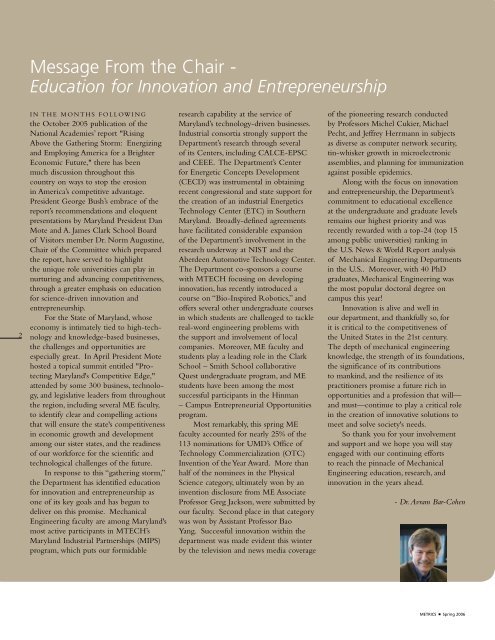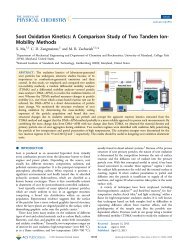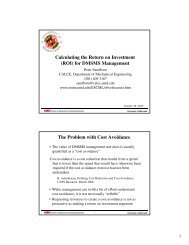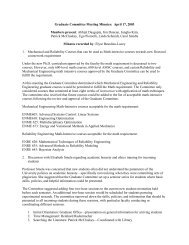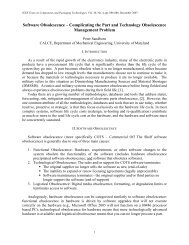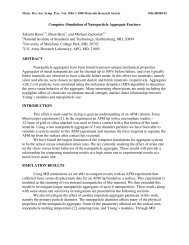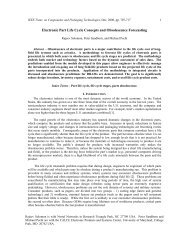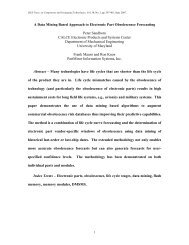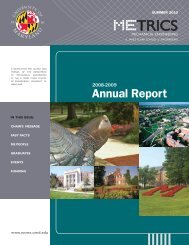METRICS - Mechanical Engineering - University of Maryland
METRICS - Mechanical Engineering - University of Maryland
METRICS - Mechanical Engineering - University of Maryland
Create successful ePaper yourself
Turn your PDF publications into a flip-book with our unique Google optimized e-Paper software.
2<br />
Message From the Chair -<br />
Education for Innovation and Entrepreneurship<br />
IN THE MONTHS FOLLOWING<br />
the October 2005 publication <strong>of</strong> the<br />
National Academies’ report "Rising<br />
Above the Gathering Storm: Energizing<br />
and Employing America for a Brighter<br />
Economic Future," there has been<br />
much discussion throughout this<br />
country on ways to stop the erosion<br />
in America’s competitive advantage.<br />
President George Bush’s embrace <strong>of</strong> the<br />
report’s recommendations and eloquent<br />
presentations by <strong>Maryland</strong> President Dan<br />
Mote and A. James Clark School Board<br />
<strong>of</strong> Visitors member Dr. Norm Augustine,<br />
Chair <strong>of</strong> the Committee which prepared<br />
the report, have served to highlight<br />
the unique role universities can play in<br />
nurturing and advancing competitiveness,<br />
through a greater emphasis on education<br />
for science-driven innovation and<br />
entrepreneurship.<br />
For the State <strong>of</strong> <strong>Maryland</strong>, whose<br />
economy is intimately tied to high-technology<br />
and knowledge-based businesses,<br />
the challenges and opportunities are<br />
especially great. In April President Mote<br />
hosted a topical summit entitled "Protecting<br />
<strong>Maryland</strong>'s Competitive Edge,"<br />
attended by some 300 business, technology,<br />
and legislative leaders from throughout<br />
the region, including several ME faculty,<br />
to identify clear and compelling actions<br />
that will ensure the state's competitiveness<br />
in economic growth and development<br />
among our sister states, and the readiness<br />
<strong>of</strong> our workforce for the scientific and<br />
technological challenges <strong>of</strong> the future.<br />
In response to this “gathering storm,”<br />
the Department has identified education<br />
for innovation and entrepreneurship as<br />
one <strong>of</strong> its key goals and has begun to<br />
deliver on this promise. <strong>Mechanical</strong><br />
<strong>Engineering</strong> faculty are among <strong>Maryland</strong>'s<br />
most active participants in MTECH’s<br />
<strong>Maryland</strong> Industrial Partnerships (MIPS)<br />
program, which puts our formidable<br />
research capability at the service <strong>of</strong><br />
<strong>Maryland</strong>’s technology-driven businesses.<br />
Industrial consortia strongly support the<br />
Department’s research through several<br />
<strong>of</strong> its Centers, including CALCE-EPSC<br />
and CEEE. The Department’s Center<br />
for Energetic Concepts Development<br />
(CECD) was instrumental in obtaining<br />
recent congressional and state support for<br />
the creation <strong>of</strong> an industrial Energetics<br />
Technology Center (ETC) in Southern<br />
<strong>Maryland</strong>. Broadly-defined agreements<br />
have facilitated considerable expansion<br />
<strong>of</strong> the Department’s involvement in the<br />
research underway at NIST and the<br />
Aberdeen Automotive Technology Center.<br />
The Department co-sponsors a course<br />
with MTECH focusing on developing<br />
innovation, has recently introduced a<br />
course on “Bio-Inspired Robotics,” and<br />
<strong>of</strong>fers several other undergraduate courses<br />
in which students are challenged to tackle<br />
real-word engineering problems with<br />
the support and involvement <strong>of</strong> local<br />
companies. Moreover, ME faculty and<br />
students play a leading role in the Clark<br />
School – Smith School collaborative<br />
Quest undergraduate program, and ME<br />
students have been among the most<br />
successful participants in the Hinman<br />
– Campus Entrepreneurial Opportunities<br />
program.<br />
Most remarkably, this spring ME<br />
faculty accounted for nearly 25% <strong>of</strong> the<br />
113 nominations for UMD’s Office <strong>of</strong><br />
Technology Commercialization (OTC)<br />
Invention <strong>of</strong> the Year Award. More than<br />
half <strong>of</strong> the nominees in the Physical<br />
Science category, ultimately won by an<br />
invention disclosure from ME Associate<br />
Pr<strong>of</strong>essor Greg Jackson, were submitted by<br />
our faculty. Second place in that category<br />
was won by Assistant Pr<strong>of</strong>essor Bao<br />
Yang. Successful innovation within the<br />
department was made evident this winter<br />
by the television and news media coverage<br />
<strong>of</strong> the pioneering research conducted<br />
by Pr<strong>of</strong>essors Michel Cukier, Michael<br />
Pecht, and Jeffrey Herrmann in subjects<br />
as diverse as computer network security,<br />
tin-whisker growth in microelectronic<br />
assemblies, and planning for immunization<br />
against possible epidemics.<br />
Along with the focus on innovation<br />
and entrepreneurship, the Department’s<br />
commitment to educational excellence<br />
at the undergraduate and graduate levels<br />
remains our highest priority and was<br />
recently rewarded with a top-24 (top 15<br />
among public universities) ranking in<br />
the U.S. News & World Report analysis<br />
<strong>of</strong> <strong>Mechanical</strong> <strong>Engineering</strong> Departments<br />
in the U.S.. Moreover, with 40 PhD<br />
graduates, <strong>Mechanical</strong> <strong>Engineering</strong> was<br />
the most popular doctoral degree on<br />
campus this year!<br />
Innovation is alive and well in<br />
our department, and thankfully so, for<br />
it is critical to the competitiveness <strong>of</strong><br />
the United States in the 21st century.<br />
The depth <strong>of</strong> mechanical engineering<br />
knowledge, the strength <strong>of</strong> its foundations,<br />
the significance <strong>of</strong> its contributions<br />
to mankind, and the resilience <strong>of</strong> its<br />
practitioners promise a future rich in<br />
opportunities and a pr<strong>of</strong>ession that will—<br />
and must—continue to play a critical role<br />
in the creation <strong>of</strong> innovative solutions to<br />
meet and solve society's needs.<br />
So thank you for your involvement<br />
and support and we hope you will stay<br />
engaged with our continuing efforts<br />
to reach the pinnacle <strong>of</strong> <strong>Mechanical</strong><br />
<strong>Engineering</strong> education, research, and<br />
innovation in the years ahead.<br />
- Dr. Avram Bar-Cohen<br />
<strong>METRICS</strong> � Spring 2006


